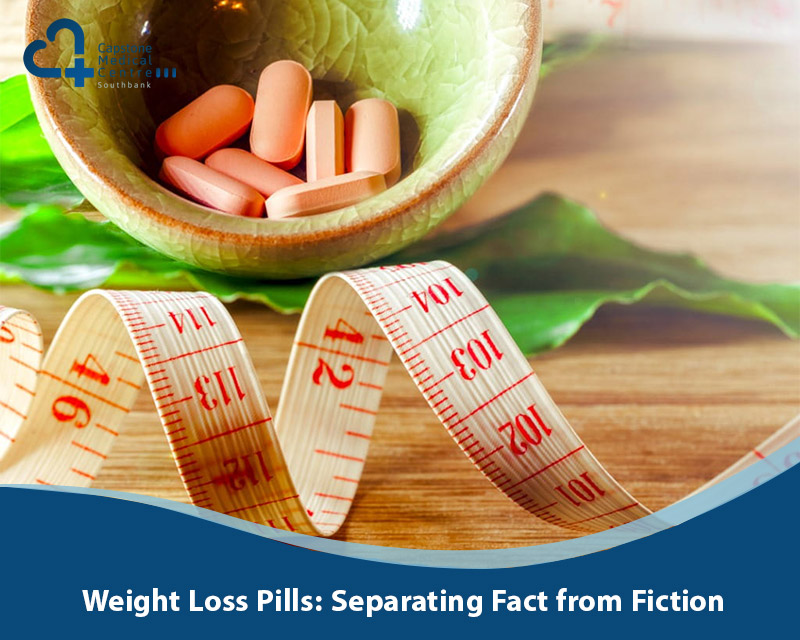The market for Weight loss pills has become increasingly saturated, making it more important than ever to separate fact from fiction. Although weight loss medications promise quick results, it’s essential to remember that there’s no magic bullet for weight loss.
Achieving and maintaining a healthy weight involves a balanced diet, regular exercise, and, in some cases, medication.
The popularity of these types of medications can be attributed to the desire for a convenient solution. However, consulting with professionals at a weight loss clinic in Capstone Medical Centre before starting any new regimen is essential. Remember, your health is an investment, not an expense.
Types of Weight Loss Pills
Understanding the different types of weight loss pills, their mechanisms, and the common ingredients can help you make informed decisions about your health and wellness journey.
Weight loss medications can be broadly classified into several categories based on their mechanism of action.
Appetite suppressants
The first category is appetite suppressants. These pills work by reducing your appetite, making you feel full sooner or for a longer time. They achieve this by increasing levels of serotonin or catecholamine – chemicals that control feelings of fullness and satisfaction.
Fat burners
The second category is fat burners or thermogenic. These pills aim to increase your metabolism, helping your body burn more calories. They typically contain ingredients like caffeine or capsaicin that can boost metabolic rate, increase fat oxidation, and even increase energy expenditure during exercise.
Carb blockers
The third category is carb blockers or starch blockers. These pills are designed to prevent your body from digesting and absorbing carbohydrates, thereby reducing the total number of calories you absorb. They work by inhibiting the action of certain enzymes that digest carbohydrates in your diet.
Fat blockers
The fourth category is fat blockers. Like carb blockers, fat blockers prevent your body from digesting and absorbing dietary fat, reducing calorie intake.
Prescription weight loss pills
Lastly, there are prescription weight loss medications. Doctors usually prescribe these for individuals who cannot lose weight through diet and exercise alone.

Ingredients
- Common ingredients in weight loss pills include caffeine, which is known for its fat-burning properties and ability to increase energy levels.
- Green tea extract is another popular ingredient, praised for its rich antioxidant content and potential to increase fat oxidation.
- Forskolin, derived from the root of a mint plant, is believed to help with weight loss by creating enzymes called lipase and adenylate cyclase.
- We also see the emergence of new ingredients in weight loss medications. Garcinia Cambogia, a tropical fruit also known as the Malabar tamarind, is gaining popularity. The fruit’s peel contains high amounts of hydroxy citric acid (HCA), believed to aid weight loss.
While weight loss pills can aid your journey, they are not magic bullets. They should be used in conjunction with a healthy diet and regular exercise. Always consult with professionals in the Healthy Weight Clinic at Capstone Medical Centre before starting any new regimen.
How Weight Loss Pills Work

Weight loss pills work through various mechanisms, each targeting a different aspect of weight management. Here’s a look at how some popular weight loss pill ingredients work:
1. Appetite Suppression:
Some weight loss medications work by suppressing appetite. They achieve this by mimicking hormones like GLP-1, a gut hormone involved in blood glucose control, digestion, and appetite management. For example, Semaglutide, an active ingredient in many pills, mimics a hormone that the intestine releases after eating, causing you to feel full.
2. Metabolism Boost:
Certain ingredients in weight loss pills can help increase your metabolism, helping your body burn more calories. This is often achieved through thermogenesis, where the body’s core temperature is slightly raised to enhance calorie burning.
3. Fat Absorption:
Some medications block the absorption of fat in your diet. These fat blockers prevent your body from digesting and absorbing dietary fat, reducing calorie intake.
4. Carbohydrate Absorption:
Similar to fat blockers, carb blockers prevent your body from digesting and absorbing carbohydrates, thereby reducing the total number of calories you absorb.
It’s important to note that while these mechanisms can aid in weight loss, they are not a substitute for a healthy diet and regular exercise.
Weight Loss Pills: Efficacy and Safety

The efficacy and safety of weight loss pills are topics of ongoing research and debate. Various health organizations have hailed some weight loss drugs as ‘game changers’. These medications have revolutionized weight loss and raised the possibility of reversing the obesity crisis.
However, while these drugs have shown impressive results in terms of weight loss, their long-term health impacts are still unknown. Potential side effects being investigated include hair loss, aspiration (when food or other objects get into the airways), and suicidal ideation.
- Might be interesting: Are hair loss treatments worth it?
Moreover, Common side effects include nausea, diarrhea, and vomiting. Many patients must stay on the drugs for life to keep the weight off, and the long-term impacts of these treatments remain unknown.
Regulation and Approval of Weight Loss Pills
The Therapeutic Goods Administration (TGA) regulates weight loss medications in Australia. The TGA ensures that these medications are safe and effective before they reach consumers. However, the level of regulation varies depending on whether the weight loss pill is classified as a prescription medication or an over-the-counter (OTC) supplement.
Prescription weight loss pills are medications that you get through your doctor. They are rigorously tested in clinical trials, and their safety and efficacy must be demonstrated before the TGA can approve them. Once approved, they are subject to ongoing monitoring to detect any adverse effects that may not have been apparent in the initial trials.
On the other hand, OTC weight loss supplements do not require premarket review or approval by the TGA. Instead, supplement manufacturers are responsible for ensuring that their products are safe and that their claims are truthful and not misleading.
The Therapeutic Goods Administration can act against OTC supplement manufacturers if their products are unsafe or if their claims are false and misleading.
Whether you choose a prescription weight loss pill or an OTC supplement, it’s crucial to consult with a healthy weight clinic. They can provide personalised advice based on your health history and current situation.
Choosing the Right Weight Loss Pill

Choosing the right weight loss medication is a decision that should be made with careful consideration and consultation with healthcare professionals. There are some factors to consider:
Health Status
Your current health status is a crucial factor. If you have a health condition, it’s very important to consult your doctor before taking dietary or weight loss drugs. This is especially necessary if you have high blood pressure, diabetes, heart disease, liver disease, or other medical conditions.
Age
Age can affect how your body responds to weight loss pills. For instance, seniors may have a slower metabolic rate, making weight loss more challenging. Therefore, the choice of weight loss pill may vary based on age.
Lifestyle
Your lifestyle, including your diet and exercise habits, can influence the effectiveness of medications. Most weight loss drugs are intended to be used along with diet and exercise.
Personalised Medication
Personalised weight loss medication is emerging as a groundbreaking trend, revolutionising how we approach obesity and weight management. This trend acknowledges that weight loss is not a one-size-fits-all journey.
- Related Article: Seasonal and Festive Factors: Do They Influence Weight Gain?
Alternative Approaches to Weight Loss

In the quest for losing weight, it’s important to remember that pills are not the only solution. In fact, many health experts emphasise non-pill-based strategies as the most effective and sustainable approach to weight management.
1. Dietary Changes
Adopting a balanced, nutrient-rich diet is a key factor in weight loss. There’s a shift away from restrictive diets to more sustainable eating habits. For instance, plant-based eating continues to rise in popularity for its positive impact on weight loss and its environmental and ethical benefits.
2. Exercise
Regular physical activity is crucial for burning calories and improving overall health. Incorporating aerobic exercises, like walking or cycling, and strength training exercises into your routine is recommended.
3. Behavior Modification
This involves changing your behaviour and mindset towards food and exercise. Techniques can include setting realistic goals, keeping a food diary, and practising mindful eating.
4. Stress Management
Stress can lead to overeating and weight gain. Therefore, managing stress through techniques like yoga, meditation, and deep breathing can be beneficial.
5. Sleep
Adequate sleep is often overlooked as a weight loss strategy, but it’s essential for regulating hunger hormones and promoting overall health.
6. Personalized Nutrition
Personalised nutrition is emerging as a groundbreaking trend, revolutionising how we approach obesity and weight management. This trend acknowledges that weight loss is not a one-size-fits-all plan.
Myths and Misconceptions About Weight Loss Pills

Here are some common myths and evidence-based facts to debunk:
Myth 1: Weight Loss Pills are a Magic medication for Weight Loss
Fact: A common misconception about weight loss supplements is that they offer an effortless solution to weight loss. Many believe that consuming a pill or a shake can miraculously dissolve fat and help them attain their ideal physique without any additional effort. However, this is not the case. Weight loss pills are not a miracle cure. They aid in weight loss with a balanced diet and consistent physical activity.
Myth 2: Everyone is Taking These Medications
Fact: The increasing interest in weight loss medications may lead some to believe more patients are taking these prescription drugs than in reality. According to some facts, less than 2% of patients eligible for obesity drugs have been prescribed the medication.
Myth 3: Weight Loss Medications Cause Suicidal Ideation
Fact: While some medications have been associated with mental health side effects, it’s important to note that these side effects are not common and usually occur in individuals with a history of mental health disorders. It’s crucial to discuss any potential side effects with a healthcare professional before starting any new medication.
Myth 4: Weight Loss Pills are Unsafe
Fact: While all medications carry some risk of side effects, weight loss pills approved by regulatory bodies like the FDA have undergone rigorous testing to ensure their safety. Any potential risks are usually outweighed by the benefits for individuals who are overweight or obese.
Conclusion
In conclusion, weight loss pills can be useful in your weight management journey, but they are not a magical solution. They should be used in conjunction with a healthy diet, regular exercise, and guidance from healthcare professionals.
If you’re considering weight loss medications, we highly recommend consulting with the experts at Capstone Medical Centre. Our team of professionals can provide personalised advice based on your health history and current situation in a weight loss clinic, helping you make an informed decision about your weight loss journey.
Sources:


2 thoughts on “Weight Loss Pills: Separating Fact from Fiction”
Comments are closed.